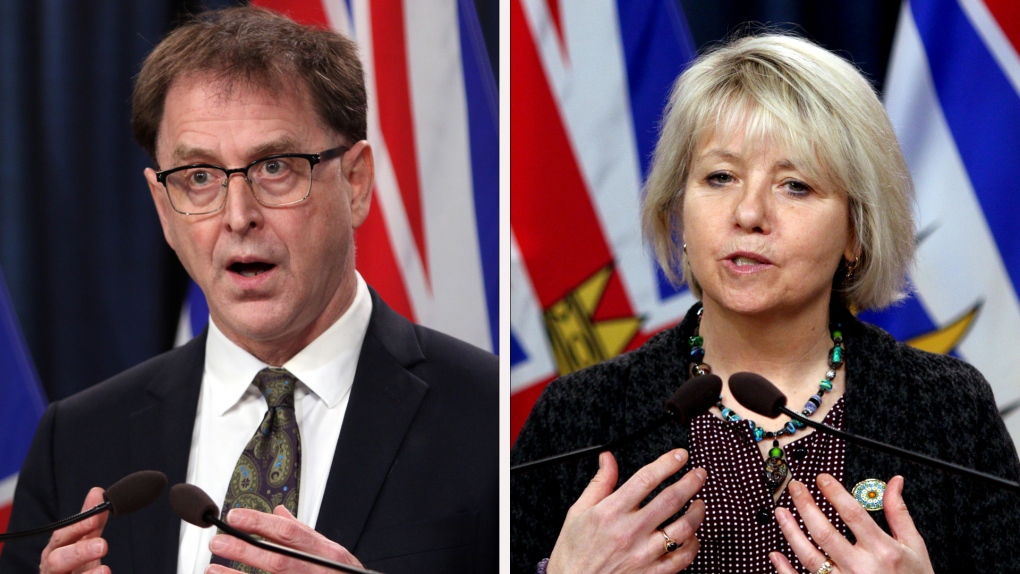B.C. officials respond to WHO declaration that COVID-19 is no longer a global health emergency

B.C.'s top health officials are responding to the World Health Organization's announcement Friday that COVID-19 is no longer a global health emergency, marking the end of the pandemic after more than three years.
Health Minister Adrian Dix and Dr. Bonnie Henry, the provincial health officer, issued a joint statement following the WHO's declaration.
“We have been transitioning out of the emergency phase of the COVID-19 pandemic for some time now, and have been integrating COVID-19 surveillance, monitoring, processes and supports into our regular health system operations,” reads the statement.
The officials stressed that COVID-19 is still with us, and the virus is expected to exist in society for the “foreseeable future.”
“We need to continue to monitor and to take measures we know protect ourselves and others,” the statement warns.
Dix and Henry said vaccinations, infections and boosters have given the population a high level of immunity, meaning the virus is “no longer causing severe disease in most people.”
Despite this, B.C. is not making any changes to its current COVID-19 vaccination requirements, the pair said.
“At this time, COVID-19 vaccination requirements for health-care system workers remain in place. We will continue to monitor the situation during this transition phase and ensure our public health response continues to protect those who are most vulnerable to COVID-19,” said Dix and Henry.
They continue to encourage everyone to pay attention to lessons learned throughout the pandemic.
“COVID-19 is another respiratory illness we must pay attention to and use the tools we have learned. We encourage everyone to take appropriate measures to prevent the spread of respiratory illnesses, including COVID-19,” said the pair.
The statement includes the following list of suggested steps to prevent spread:
- getting vaccinated and staying up to date on booster doses;
- staying at home if you feel unwell and staying away from people at higher risk of serious illness if you have symptoms;
- wearing a mask if you have respiratory symptoms, or are recovering from a respiratory illness, and you are around others, especially people at higher risk of serious illness; and
- practising good respiratory etiquette and hand hygiene.
Dix and Henry said they are continuing to incorporate lessons learned from the COVID-19 pandemic into emergency planning and response, so that they are “better positioned and better prepared for future public health emergencies.”
CTVNews.ca Top Stories

BREAKING Average hourly wage in Canada now $34.95: StatCan
Average hourly wages among Canadian employees rose to $34.95 on a year-over-year basis in April, a 4.7 per cent increase, according to a Statistics Canada report released Friday morning.
From outer space? Sask. farmers baffled after discovering strange wreckage in field
A family of fifth generation farmers from Ituna, Sask. are trying to find answers after discovering several strange objects lying on their land.
This iconic Canadian song is turning 50
Andy Kim's 'Rock Me Gently' is marking a major milestone, as it celebrates its 50th anniversary.
Oprah Winfrey: I set an unrealistic standard for dieting
Oprah Winfrey said on Thursday evening that she has long played a role in promoting unhealthy and unrealistic diets.
Ontario family receives massive hospital bill as part of LTC law, refuses to pay
A southwestern Ontario woman has received an $8,400 bill from a hospital in Windsor, Ont., after she refused to put her mother in a nursing home she hated -- and she says she has no intention of paying it.
Toronto police called to Drake's Bridle Path mansion for another alleged intruder on Thursday
Toronto police say a man who allegedly attempted to access Drake’s Bridle Path property was taken to hospital on Thursday after an altercation with security guards.
Flat tire on a highway? Here's why you shouldn't try to fix it
If you're cruising down a highway and realize you have a flat tire, you may want to think twice before stopping to fix it on the side of the road.
Storm-battered U.S. South is again under threat. A boy swept into a drain fights for his life
Dangerous storms crashed over parts of the U.S. South on Thursday even as the region cleaned up from earlier severe weather that spawned tornadoes, killed at least three people, and gravely injured a boy who was swept into a storm drain as he played in a flooded street.
Broadcaster and commentator Rex Murphy dead at 77: National Post
The National Post is reporting that Rex Murphy, the pundit and columnist who hosted a national call-in radio show for decades, has died.

































